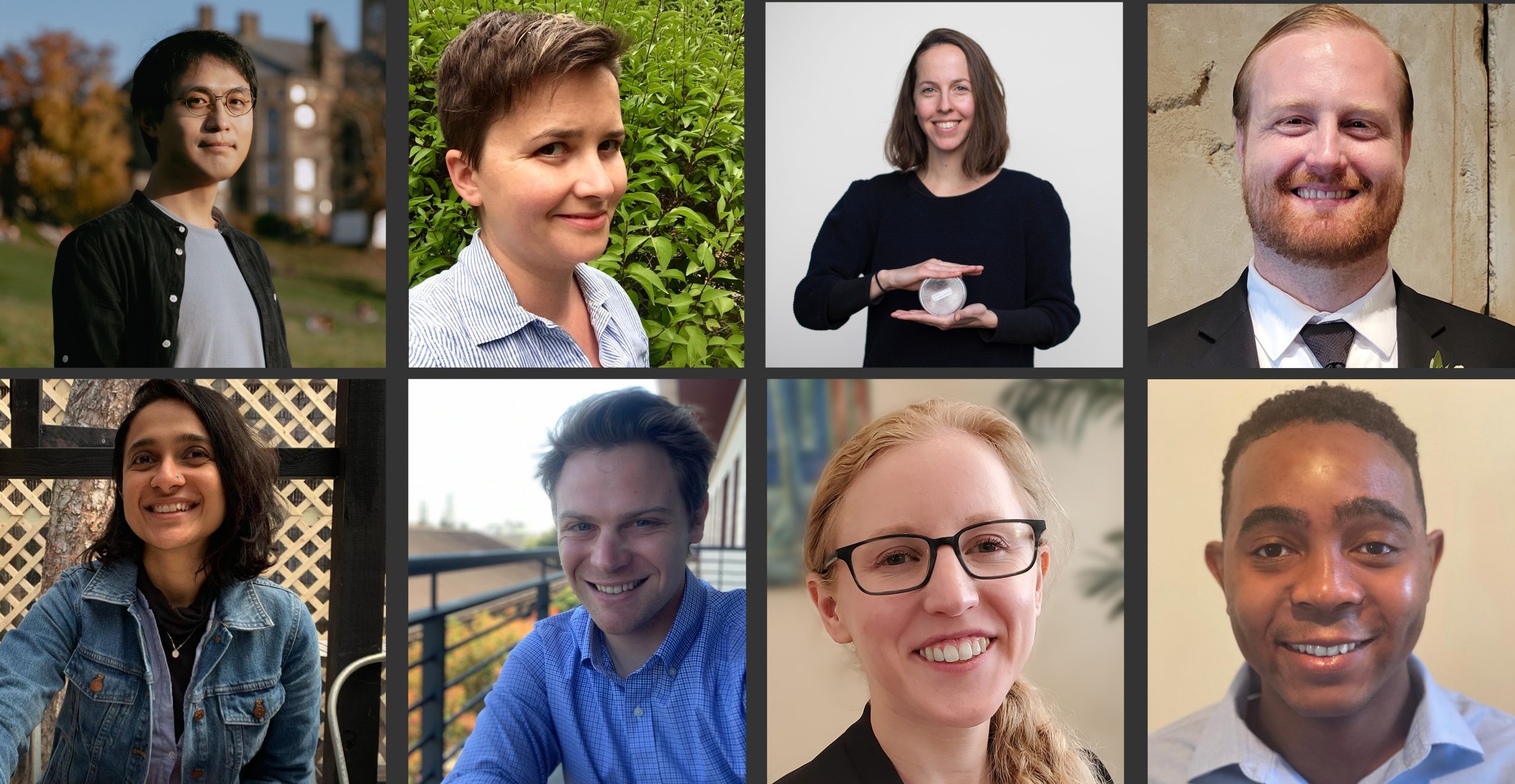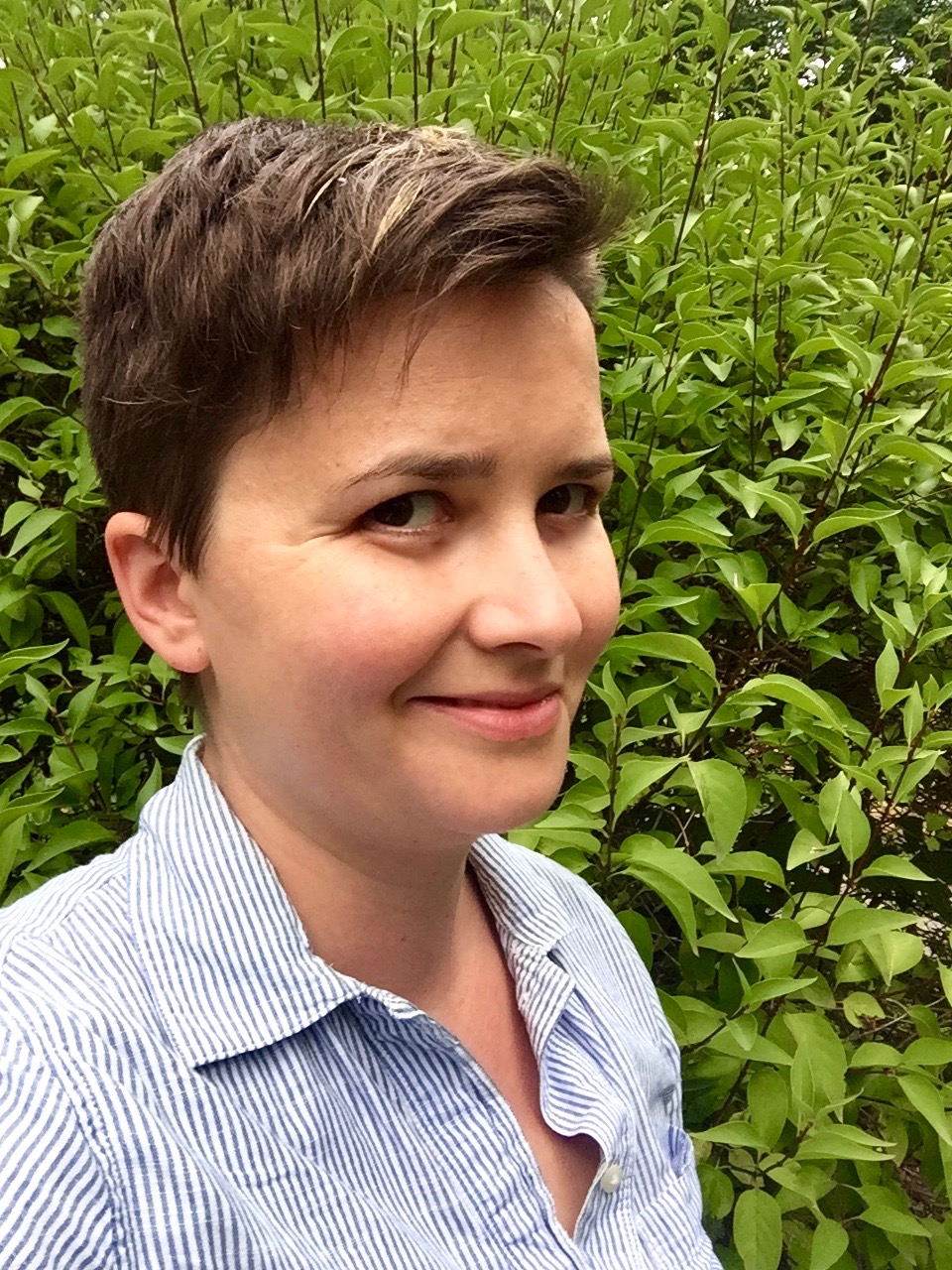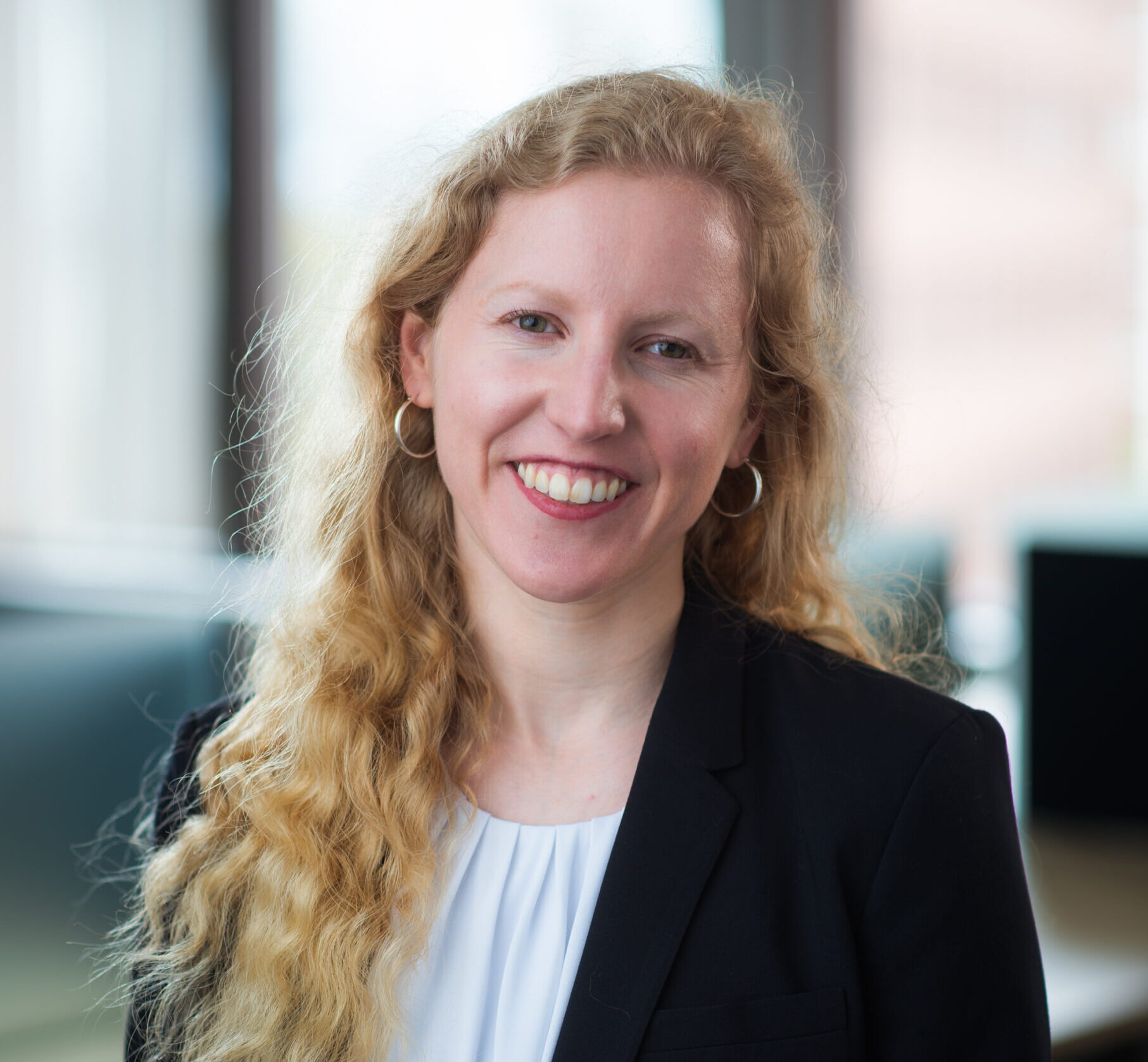Impact Fellows Join the MCSC Eager & Prepared to Achieve Real-World Impact in Sustainability
September 22, 2021

Members of the inaugural cohort of the MIT Climate & Sustainability Consortium (MCSC) Impact Fellows Program are beginning the fall semester prepared to make their marks on the climate industry and apply their expertise to near-term change for a more sustainable future. Coming from a wide range of backgrounds and experiences, the postdoctoral fellows are joining the program to transcend academia and industry and work with MIT researchers and consortium industry members – in collaboration with external organizations and communities – to implement solutions needed for global economic transformation to address the global climate change and sustainability crisis. Throughout the program, Impact Fellows will prepare for leadership positions within the sustainability domain in a wide range of contexts, as well as prepare to drive research that advances breakthrough scalable solutions towards accelerated change.
More specifically, the Fellows are working on key topics that MCSC member companies have identified as critical to address in order to make important progress toward their climate targets: decarbonizing transportation, supply chain resilience, materials circularity, and carbon removal. Within these areas, Impact Fellows will partner with member companies to define and develop the tools, processes, and organizational changes needed to make strides toward solutions, as well as uncover new layers and nuances to the challenges. The MCSC is pleased to introduce its new cohort of Impact Fellows.
Xiangkun (Elvis) Cao, who earned his Ph.D. in Mechanical Engineering from Cornell University, brings a background in translational research, policymaking, entrepreneurship, and social engagement in carbon capture, utilization, and storage (CCUS) and sustainability to the MCSC.
“My passion centers on scalable, expandable, and economically feasible technologies to enable near-term impact in the real world,” explained Elvis. Throughout his Ph.D. research, leading a project to turn waste CO2 into a valuable resource has seen then 26-year-old Elvis recognized in Forbes’ 2019 list of 30 under 30 fueling a more sustainable future. The industrial partner in this effort was also named one of the ten finalist teams worldwide for the $20M NRG COSIA Carbon XPRIZE, a global competition to develop breakthrough technologies for CO2 conversion. Recently, his C2X initiative to re-imagine our carbon liability as an opportunity was featured as the US winner for the 2021 Youth Innovation Challenge hosted by the Commission for Environmental Cooperation.
As a carbontech researcher and entrepreneur, Elvis is also active in science-driven policymaking and social engagement. He contributed to policymaking by co-authoring a global roadmap on energy transition as a UN Technical Working Group Member, and served as a panelist in the UN DESA Global Policy Dialogues for Climate Action. Most recently, he co-authored an opinion article on sustainability policymaking published by the Cell Press.
As a first-generation student who navigated his way through hardship from rural China to landing on Forbes 30 Under 30 for North America, Elvis is also active in promoting diversity and inclusion within climate and sustainability and beyond by his writing on Matter (Cell Press) and Lindau Nobel Meetings. He also shared his story on a global platform in an interview piece “My Journey from Poverty to College” by the China Current. Most recently, his artwork has been selected to be featured as the front cover for the December issue of Analytical Chemistry (ACS) in its Diversity & Inclusion Cover Art Series.
“I am excited about this Fellowship because of the unique opportunity to work alongside industrial member companies in their decarbonization process and explore pathways toward reducing the companies’ environmental footprint while increasing the efficiency of a growing enterprise. I also see the opportunity to inspire other people, especially those from historically underrepresented backgrounds, so that we can ensure a just transition for all,” Elvis concluded.

Some of the most rewarding experiences in my academic background have involved unlikely engagements across differences of perspective but toward a common goal.
Laura Frye-Levine, a social scientist with a multidisciplinary background, holds PhDs in Sociology and Environmental Studies from University of Wisconsin-Madison. She brings expertise from working in the areas of sustainable urban metabolism, rural development, and environmental media to her role as MCSC Impact Fellow.
“This Impact Fellowship provides an opportunity for emerging scholars to mobilize integrative and collaborative solutions, and provides access to organizations in industry eager to engage with new and innovative thinking required to address the climate crisis,” said Laura. “Having worked with peers and mentors from multiple disciplines in several collaborative multidisciplinary environments, I recognize that such environments are important crucibles for change.”
Most recently, Laura has been serving as a Postdoctoral Associate in the Program in Science, Technology and Society (STS) at MIT, where she worked on a monograph investigating the translation of ecological values into the policy process. Her academic research explores the tensions and opportunities presented by interdisciplinary approaches to environmental sustainability.
Laura holds degrees in geoscience, environmental science, environmental studies, and sociology. Prior to entering academia, she spent several years in sustainable community development, building skills in cross-cultural communication, stakeholder engagement, and on-the-ground conservation in projects in Southeast Alaska and Honduras. At the conclusion of her master’s degree in environmental science at the Yale School of the Environment, Laura fundraised to create a documentary film, which allowed peasant Honduran coffee growers to communicate their conservation story directly to an international audience. She then served for three years as Director of Research for a small, architecturally-driven urban sustainability organization engaged in solar energy, net-zero architecture, and sustainable urbanism. With a multi-disciplinary and multi-national team, the Center for Sustainable Cities (CSC) developed “multiple-alternative scenario building,” an innovative tool for facilitating equitable engagement among community stakeholders. As a capstone to her work at the CSC, she published a manuscript outlining design science as a framework for environmental policy that could supersede policy mechanisms relying on efficiency criteria alone.
“Some of the most rewarding experiences in my academic background have involved unlikely engagements across differences of perspective but toward a common goal,” concluded Laura. “I feel strongly not only about the importance of breaking down disciplinary silos, but also in engaging, in real and tangible ways, on matters of eminent and existential societal importance.”
Paloma Gonzalez-Rojas, who earned her PhD in Design and Computation with a Computer Science Minor from MIT, joins the MCSC with strong technical expertise paired with extensive entrepreneurial activities working alongside experts in the MIT community, governments, and companies. She co-founded The New Materials (TNM), a platform company for new biodegradable materials; the team is currently applying mass spectrometry to identify the chemical structure of their polymer and obtain a provisional patent.
“Applying this technology was a big challenge because I learned which chemicals dissolve our material to test it in a week,” explained Paloma. “We are testing the industrial scalability of the material with computation and advanced manufacturing to offer a viable mass-produced replacement for flexible plastic.”
During her PhD program, she held a leadership role in the Machu Picchu Design Heritage project and has worked with the Peruvian Government as a vital stakeholder for the project’s research development. Together, they digitized the Inca monument for developing Artificial Intelligence (AI) and mixed reality applications and the site became the case study for her dissertation, which used AI to simulate pedestrians exploring an urban environment.
Paloma’s work goes beyond isolated interventions by installing capacities locally, transferring knowledge from MIT to local communities; she has taught and trained local universities and government members and focused on empowering vulnerable partners.
“An advantage of being a Latin woman is that I understand scarcity. This made me understand that achieving ecological and social sustainability will only succeed through economic sustainability,” concluded Paloma. “The MSCS Impact Fellowship is a place for me to thrive and pursue my life goal: to be a leader in sustainability, serving worldwide welfare organizations. I have a deep interest in the consortium’s mission of developing ecological materials.”
Glen Junor holds a PhD in Chemistry from the University of California, San Diego, where he embraced the opportunity to gain a deep understanding of the relationship between molecular electronic structure and chemical reactivity. Glen’s experience inside and outside the physical sciences allows him to join the MCSC with a view of both the scientific and human obstacles impeding progress towards a sustainable future, and the perspectives needed to address them.
During his PhD, Glen studied low-valent and low-coordinate main-group compounds through both synthetic and DFT methods, and applied those lessons towards small molecule activation and catalysis. He now plans to use what he learned towards the development/deployment of new, sustainable chemical systems (i.e. electrochemical synthesis, carbon capture, renewable polymers), with the ultimate goal of replacing every chemical reagent with a sustainable variant.
Glen is focused on problem-solving, and has moved between the physical sciences and engineering to address key challenges, while applying both compassion and a keen attention to equity issues to his work.
“Through the MCSC Fellowship, I hope to make a real impact on global warming by helping the transition of chemical manufacturing to renewable processes,” Glen said. “I am eager to develop collaborations to tackle barriers impeding the incorporation of sustainable chemical manufacturing into existing infrastructure.”
Poushali Maji, who received a PhD in Resource Management & Environmental Studies from the University of British Columbia, is focused on using systems modeling techniques to evaluate the cross-sectoral sustainability impacts of policy interventions, including impacts on climate, air quality and resource scarcity. She examines the benefits of clean energy transition pathways for climate, as well as for health, equitable access to energy, and regional air quality.
“I am interested in working at the interface of sustainability science and implementation on the ground,” she explained. Having worked in key sectors that are crucial to climate impact, such as electricity and land use, Poushali is focused on expanding her expertise to other areas such as waste and circularity.
“As a society thinking about solutions to complex challenges, we often focus on technological advances. But the efficacy of technological solutions in bringing about desired change depends on non-technological aspects of implementation on-the-ground, such as scalability of solutions, incentives for individuals to adopt technologies, and institutional configurations,” she said. “I am interested in working on making solutions to societal challenges a circular systemic process, instead of a linear process of technological innovation, that accounts for heterogenous interactions between technological and human elements and includes feedback from practice.”
Poushali aims to identify actionable areas for carbon emission reduction, taking into account the feasibility of implementation of policy options and their distributional impacts, in addition to measurable climate and sustainability benefits of policies. Her work on analyzing sustainability strategies and science-policy interfaces, as well as activities involving sustainability at a grassroots level and collaboration with policymakers, highlights her interest in the implementation of solutions to sustainability challenges and their equity implications.
In her research, Poushali uses data and models to understand the extent of sustainability challenges and their inter-linkages, and assess policy options in terms of their cross-sectoral impacts so that resources can be more effectively directed to prepare for an uncertain future.
“Solutions to climate change and sustainability need to be feasible not only technologically and economically, but also in terms of individual and institutional implementation to achieve accelerated change. Through my work, I would like to demonstrate the significance of considering human elements in analyzing policy options at different scales and the need to leverage cross-disciplinary expertise to determine optimal sustainability transition pathways,” Poushali concluded.
Sam Raymond, who earned his PhD from the Department of Civil and Environmental Engineering and the Center of Computational Science and Engineering at MIT, brings a background in numerical simulation and machine learning, with applications in many different areas including biomedical devices, brain trauma diagnostics, ventilator design, and coral reefs, to the MCSC. Throughout his PhD, he explored how Big Data and machine learning can be used with advanced numerical simulation methods to build better models for prediction, classification, and understanding, in the newly developing field of Physics-Informed Machine Learning.
“It was exciting to read MIT’s recent Fast Forward: Climate Action Plan for the Decade, detailing its renewed climate response mission,” said Sam. “This plan covered many important areas, and the MCSC is situated right at the focal point of the bold direction MIT is taking to combat climate change. MIT is a leader in these efforts and being a part of the team to enact real, lasting, and impactful change will be unparalleled.”
Sam has past experiences in teaching and engaging with many different stakeholders, and is eager to continue this work not only in an academic setting, but also in the contexts of industry and policy. He has a vision for how the MIT community might look at data, machine learning, and supply chain visibility, as they relate to climate conditions, coral health, coastline and sea levels, and storms, in new and innovative ways. He hopes to also continue working to establish a nexus point for the awareness and cultivation of the effects of coral and reef destruction, as well as encouraging others to take a critical look at the efficacies of the policies that have been put in place over the last two decades.
Sam most recently held a postdoctoral position at Stanford University, where he began an unexpected intensive journey to design a rapid prototype ventilator, after having the COVID-19 pandemic take full force almost immediately upon his arrival. This was an opportunity to wear many hats – from project manager to design engineer to regulatory advisor – while helping others and seeing the project go from ideation to FDA emergency authorization.

Of the various leadership roles I pursued during my graduate education, being project coordinator for this award-winning climate change impact and adaptation initiative was one of the most rewarding.
Sydney Sroka, who earned her PhD in Mechanical Engineering and Computation from MIT, is focused on computational analysis, with applications to climate risk assessment. Her thesis focused on improving hurricane intensity forecasts through theoretical and computational models, representing the real-world applications of her investigations. She brings a robust research background to her position as an MCSC Impact Fellow, having written several finite element and finite volume frameworks for courses and research, as well as having collaborated on research projects involving spectral element and VOF codes.
“This program will help give me the opportunity to listen to the needs and challenges of a diverse array of industry partners which will provide invaluable insight into the obstacles many organizations face when trying to make their operations more sustainable,” said Sydney.
She has experience with a broad range of topics from uncertainty quantification to the microphysics of evaporation. She is looking forward to applying her computational and modeling expertise to challenging, real-world problems.
A project Sydney had the opportunity to lead estimated the flood risk to the MIT campus in the year 2050 and evaluated the cost effectiveness of several interventions. Using data from numerical models, the team employed statistical and optimization techniques, and conducted a microeconomic analysis to determine the optimal near-term investment strategy for the institute. They worked with Professor Ken Strzepek and Dr. Muge Komurcu from the MIT Center for Global Change Science (CGCS) to determine the expected storm surge and rainfall accumulation from both tropical cyclones and extratropical cyclones.
“Of the various leadership roles I pursued during my graduate education, being project coordinator for this award-winning climate change impact and adaptation initiative was one of the most rewarding,” Sydney concluded.
Augustine Zvinavashe, who will be joining the MCSC after the completion of his PhD in Materials: Advanced Biopolymers from MIT, has a multidisciplinary background in agriculture, material science, and finance combined with impressive entrepreneurship activities. His PhD program focused on “engineering the seed microenvironment” for delivering microbe-laden fertilizer to plants for greener farming.
“The MCSC Fellowship resonated with me because of the focus on climate change. My objective throughout my PhD has always been to build resilience in our food production system and society by providing a means to use ‘biofertilizers/microbes’ to boost crop production while reducing agricultural inputs,” said Augustine. “The aim has been to develop tools and technologies that improve crop yields, protect our soils and alleviate climate change effects.”
Recently, he founded Ivu Biologics, a start-up at the intersection of polymer science and biology to increase microbial diversity in plants and humans.
“As an inventor, my focus is on developing technologies that effectively deliver biofertilizers/microbes to plants,” Augustine, who developed a microbe-laden seed coating that helps alleviate salinity stress by delivering viable microbes to plants and water stress, added. “I believe I can take this groundbreaking technology and help address many of the challenges we face globally in agriculture, from improving food security across the globe to reducing the harmful environmental effects of modern farming practices. The MCSC Impact Fellowship can help me bring these simple but effective technologies to our communities.”
Since 2015, Augustine has served as a Researcher in the MIT Advanced Biopolymers Laboratory. In this role, he developed a patented technology to promote the delivery of beneficial bacteria to plants for use in agricultural and defense applications. He also led a team of researchers to implement the technology in a field experiment and developed the experimental study, short-term and long-term execution strategy and designed the operational process in the United States and Morocco.
